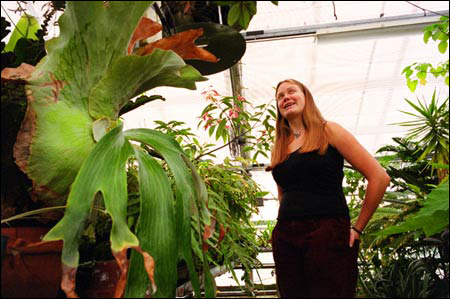What makes Carolina Johnson run?
Graduating senior plans to take on local pol in bid for Mass. legislature

Carolina Johnson knows just the job she wants after she graduates from Harvard College. She wants to represent the 25th District of Middlesex County in the Massachusetts legislature.
Johnson figures she has a shot, since there is just one other job seeker against whom she’ll be competing. Of course, that person has the advantage of having held the office since Johnson was a sophomore in high school.
Johnson’s opponent for the office is Alice Wolf, an experienced politician who also has served as a member of the Cambridge City Council, the Cambridge School Committee, and Mayor of Cambridge.
Why would a young woman fresh out of college want to run for state rep?
“Because I’m crazy?” Johnson says quickly, but it’s a throwaway line. It’s more her perception of what you must be thinking than what she thinks herself. Johnson, a tall, forthright, articulate woman from Anacortes, Wash., in the heart of Ecotopia, knows quite well she’s not crazy.
“I’ve been involved in politics since my first week at Harvard,” she explains. It started when she attended a rally for presidential candidate Al Gore. Soon afterward, she began working for Ralph Nader’s Green Party campaign, and after the election she interned in various capacities at the Massachusetts State House.
She’s also been voting in Massachusetts for years, an option she thinks more students should choose.
“I know a lot of students who absentee vote in their home state, and mostly they just vote the candidates their parents tell them to, so they’re detached from the issues there and here too. Harvard students are allowed to vote here. It’s a privilege we should take advantage of.”
Her decision to run for office came about when she spoke to a member of the search committee of the Green Rainbow Party, which was focusing on running more candidates for local offices.
“I told him I might run, but I meant it half as a joke. Then the discussion got more serious. I thought about it for a couple of weeks and I decided I would do it.”
Which brings us back to the question: Why is Johnson running?
“The current incumbent has never faced opposition,” she says. “I feel that’s symptomatic of a larger problem in Massachusetts. In the 2000 elections, three-quarters of the candidates ran unopposed. In 2002 it was slightly better, but still, there are a lot of issues that don’t get talked about. There’s no accountability, and there’s a concern that the incumbent is not representing the district as well as she could.”
Johnson says that she has spent a lot of time talking to people about their concerns and has put together a list of issues that she’ll be talking about during the campaign and doing something about if elected. They include campaign finance reform, electoral accessibility, affordable housing, environmentally efficient public transportation, and recycling.
And what about the issue of experience? Does Johnson see her youth as a liability? No. In fact, she sees it as just the opposite.
“It never occurred to me not to run because I’m young. I mean, I have experience to some extent. I care, I have passion, and if I don’t do it, no one else will. And the fact that I’m 21 and just out of college means that I have no strings attached.”
For all her enthusiasm, going into elective politics is not something Johnson ever saw herself doing.
“Six months ago, I never would have thought that I’d be running for office.”
During her college career, Johnson’s passion has been social scientific theory and research. As a social studies/women’s studies concentrator, she has focused on studying the relation of women of her own generation to feminism.
In her honors thesis she examined the assumption that young women have abandoned feminist ideals and found that this hypothesis does not fit the facts. In her interpretation, feminist principles have evolved over time. It is not that today’s young women have abandoned them but rather that they have embraced a new set of ideals that better fit their lives and psyches.
She is also interested in applying theory to practice.
“I’m trying to answer the question, How can you have a social movement in a poststructural age? I’m interested in what theoretical discourse can actually say about how people are acting in real life.”
Will Johnson pursue a life of scholarship, or will she continue to compete in the rough and tumble world of politics? To some extent, it’s up to the voters.
“If I’m elected, if I can succeed in making a difference in people’s lives, I may continue. I think being a state representative would be a great first job.”




